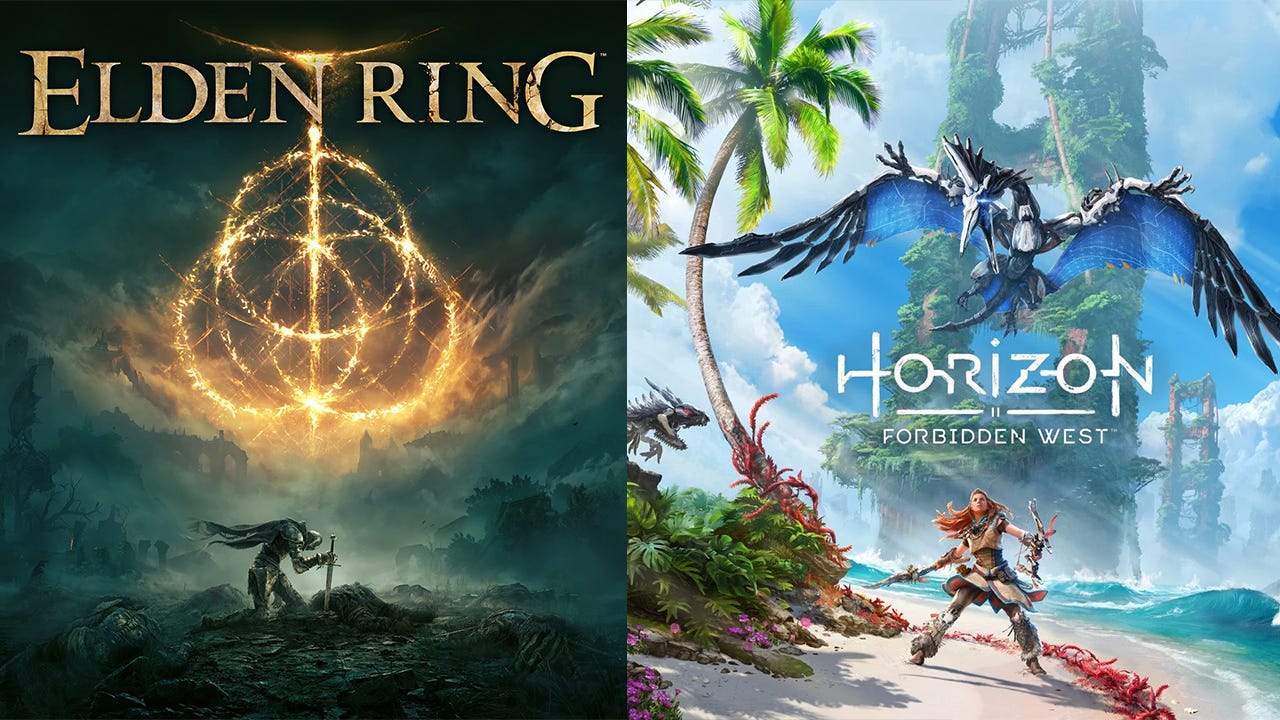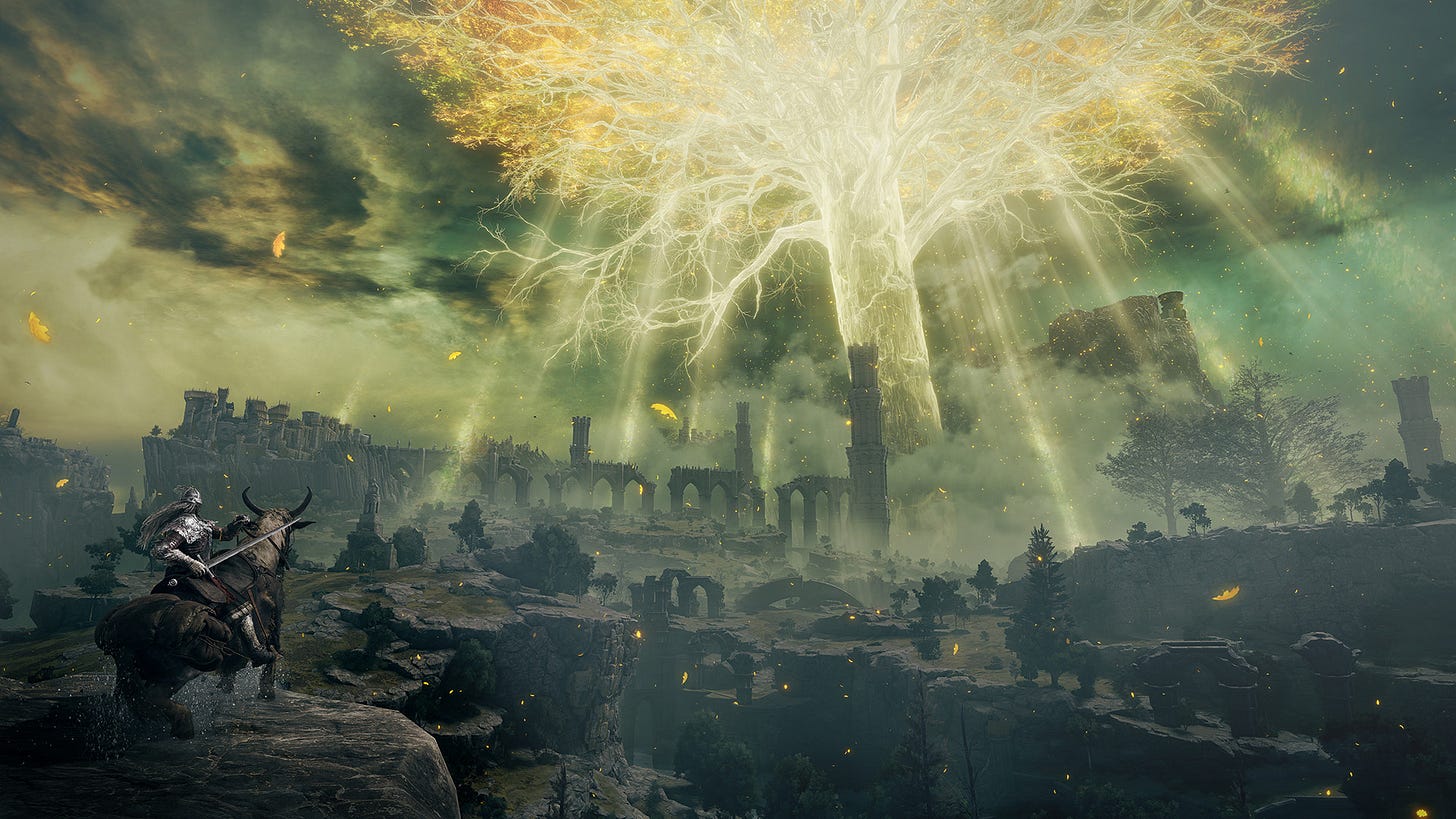Approaches to Open Worlds | Elden Ring vs. Horizon Forbidden West
Last month, two massive open world video games were released a week apart from each other - Horizon Forbidden West from Guerrilla Games and Elden Ring from FromSoftware. I made the decision to play through both of these titles concurrently, and it is not something I would recommend.
These games have many surface elements in common, but very different underlying philosophies. It makes bouncing back and forth between them very disorienting. And not just because the crouch button in Horizon causes you to consume an item in Elden Ring. What I really want to talk about is the different ways both games approach the concept of an open world, what it means to grant a player the freedom to go anywhere, and what responsibilities go along with that.
Horizon Forbidden West
Of these two games, Horizon Forbidden West is certainly the more traditional. Where it excels is in its storytelling, worldbuilding, and combat mechanics. When it comes to the open world aspect, it follows the same model that’s been laid out in pretty much every Assassin’s Creed game (and dozens of copycats) that we’ve been playing for decades now. There’s a huge map to explore, main quests, side quests, collectibles, everything you’ve come to expect from this genre. What I’ve realized about Horizon is something that I think has been present in its predecessors as well, but seems more apparent now than ever: Horizon Forbidden West is a game plagued by insecurity.
I get the sense that the Horizon designers were utterly terrified I might miss something it has to offer. Every step of the way, there’s a mechanism in place to ensure that I know exactly what’s available in my surroundings. Looking for a specific resource or location on the map? Oh, I’m going to find it, alongside about 5,000 other icons. Coming upon an enemy camp? I’ve got the power to scan the area, find out exactly what enemies there are, and what weaknesses they have. Discovered an environmental puzzle? Lead character Aloy will chime in with advice before I even get a chance to come up with a possible solution.
At one point in the game, I was hanging onto the side of a moving machine, and needed to drop down onto a platform beneath me at the right moment. This is a basic kind of platforming maneuver that we’ve seen in hundreds of games. But Horizon didn’t think I was up for the challenge. At the exact moment I needed to drop down, Aloy shouted out “Now!”, ensuring there was no chance I could miss the target. This level of handholding didn’t make me feel excited, or immersed in the world. It made me feel insulted and belittled. Apparently, Guerrilla Games thinks I’m too stupid to play without their assistance.
It feels as though the designers were worried that if I’m not being immediately stimulated or strung along on some obvious quest line, I’ll lose interest and do something else. And to some extent, I cant really blame them. This is after all, an expansive world with the potential to overwhelm. There are a million things to play these days, and if interest wanes for too long, you’re liable to move onto something else. The truth is, this is how most open world games operate, and it might not have bothered me so much, were it not for the other new game that’s been spending time in my system.
Elden Ring
If Horizon Forbidden West holds my hand, Elden Ring dangles a knife over my palm and dares me to stab myself with it. For all the similarities between these two games (open environment, intricate leveling system, variety of weapons, crafting system, special horsey to ride on), Elden Ring’s approach to the open world couldn’t be more of a departure. No one directs me to do anything in this game. Sure, there are NPCs with vague requests for help, or advice, but it’s entirely up to me if I want to engage them.
The world map indicates previously discovered recovery/warp points, but that’s about all the help it offers. Want a map crowded with icons? It’s up to me to explore and place my own markers where I feel it’s important. Coming upon an enemy camp? Well, I can try being stealthy, or use brute force, but the approach is entirely up to me, with no input from the protagonist or any side characters. I won’t know what kinds of enemies I’m facing, or where they’re coming from until I find them for myself. At times, it can be a little intimidating, like being thrown into the deep end of an Olympic-size swimming pool. But when I do manage to find my path, rescue a hidden character, or fell a terrible beast, the satisfaction is that much greater because I know I accomplished it all on my own.
Elden Ring is a game without judgement. I feel free to explore entirely at my own pace. Never does the game push me toward an important quest to progress the story. In fact, it’s often difficult to discern which quests are part of the main story, or even which discoveries I make qualify as “quests”. Nothing is automatically logged in my inventory, so I have to take notes (actual, literal notes) and use my own brain to remember which areas seemed worth venturing into. As a result, everything feels more immediate, more stimulating. The world of Elden Ring is filled to the brim with discoveries, and nearly everything I happen upon feels like a revelation. The game itself is in many ways a revelation.
The Breath of the Wild of It All
It’s hard to talk about Elden Ring or Horizon Forbidden West without mentioning the Divine Beast elephant in the room, The Legend of Zelda: Breath of the Wild. When Breath of the Wild came out in 2017, it redefined what an open world game could be. I’d go into more detail, but I think I already covered the finer points in discussing Elden Ring. Truthfully, Elden Ring couldn’t exist without Breath of the Wild. Its influence cannot be understated. While Breath of the Wild has more traditional Zelda trappings and isn’t nearly as obscure or punishing, the underlying formula is almost identical. A world is presented to be explored in whatever direction you want, and your only limit is your own capabilities. Elden Ring fully embraces this concept, and in many ways pushes it even further.
Forbidden West on the other hand, feels like it was too stubborn to learn any truly important lessons from Breath of the Wild. The elements it adopts are purely superficial, like a glider item that allows you to float down from tall places. At a glance, the world is presented with a similar promise of freedom. Every area of the map is available after a short time, but it becomes clear early on that many are actually gated behind item unlocks. These require you to complete certain missions before being let loose. It feels less like an organic world, and much more like the scripted video game that it is.
Recently, a Reddit user (u/gamboozino) posted this mockup image, imagining what Elden Ring might look like were it developed by Assassin’s Creed publisher Ubisoft. Instead of a pure, open experience, you’ve got a HUD littered with contextual hints, character dialogue and reminders to point you the right direction. It’s funny that they were making a comparison to Ubisoft, but when I saw this picture, all I could think was “Yeah, that’s Horizon.”
What makes Elden Ring so special to me is that the developers refuse to explicitly state what is and isn’t important. As a result, everything feels important. In Forbidden West, if no one tells me to go someplace and if it’s not marked on my map, I can be certain I never need to worry about going there. But in Elden Ring, I eagerly explore every facet of the world I can access, and I do it for no other reason than because it excites me. I don’t always find a powerful weapon or a new character to interact with, but I’m never disappointed with the results. Often what I’ll find is a beautiful vista or the haunting remains of some ruins, and it’s up to me to piece together what might have happened there. This is what’s made the game so addicting for me, why I keep returning to it, even though poor Horizon is waiting for me to jump back in.
Not every open world game needs to be designed with complete freedom and lack of direction. (God of War (2018) is a great example of a guided open world experience that works exactly as it should.) But I do hope that future open world games hew more closely to the Elden Ring/Breath of the Wild model than that of Horizon Forbidden West. Or at the very least, give me the option to shut Aloy up while I’m trying to solve a puzzle.










